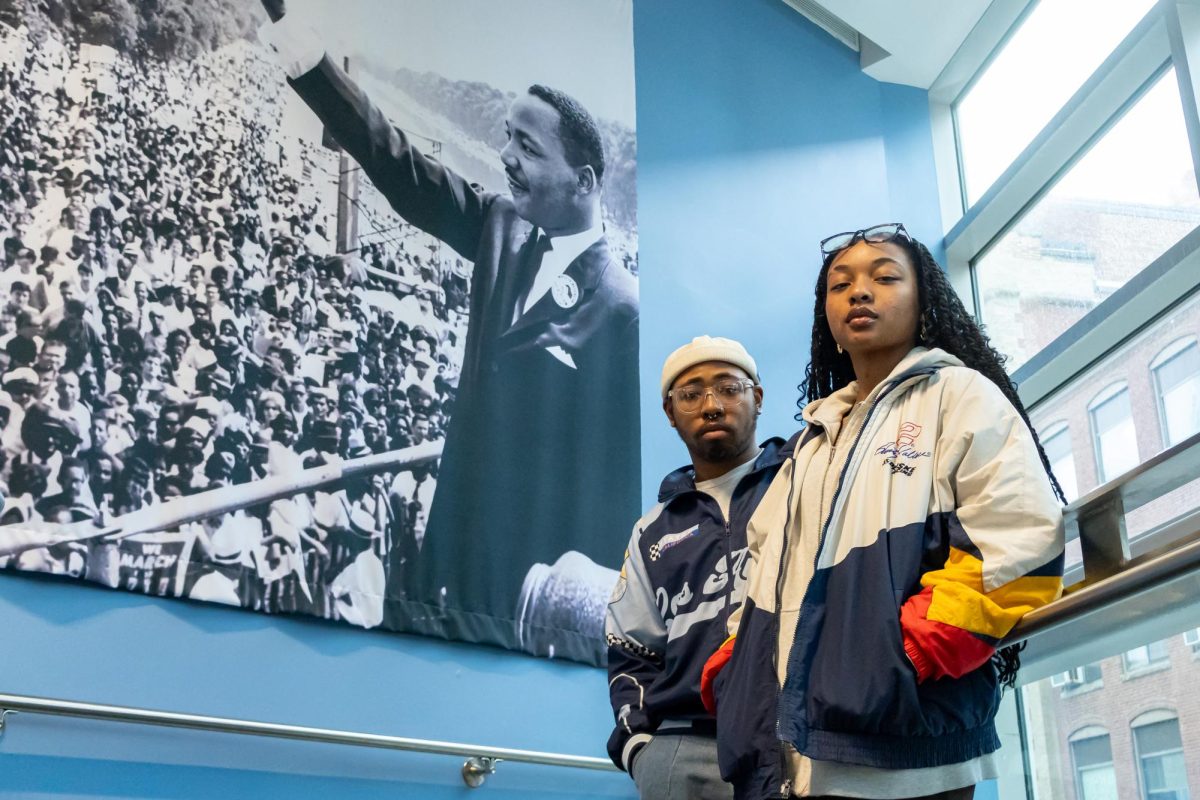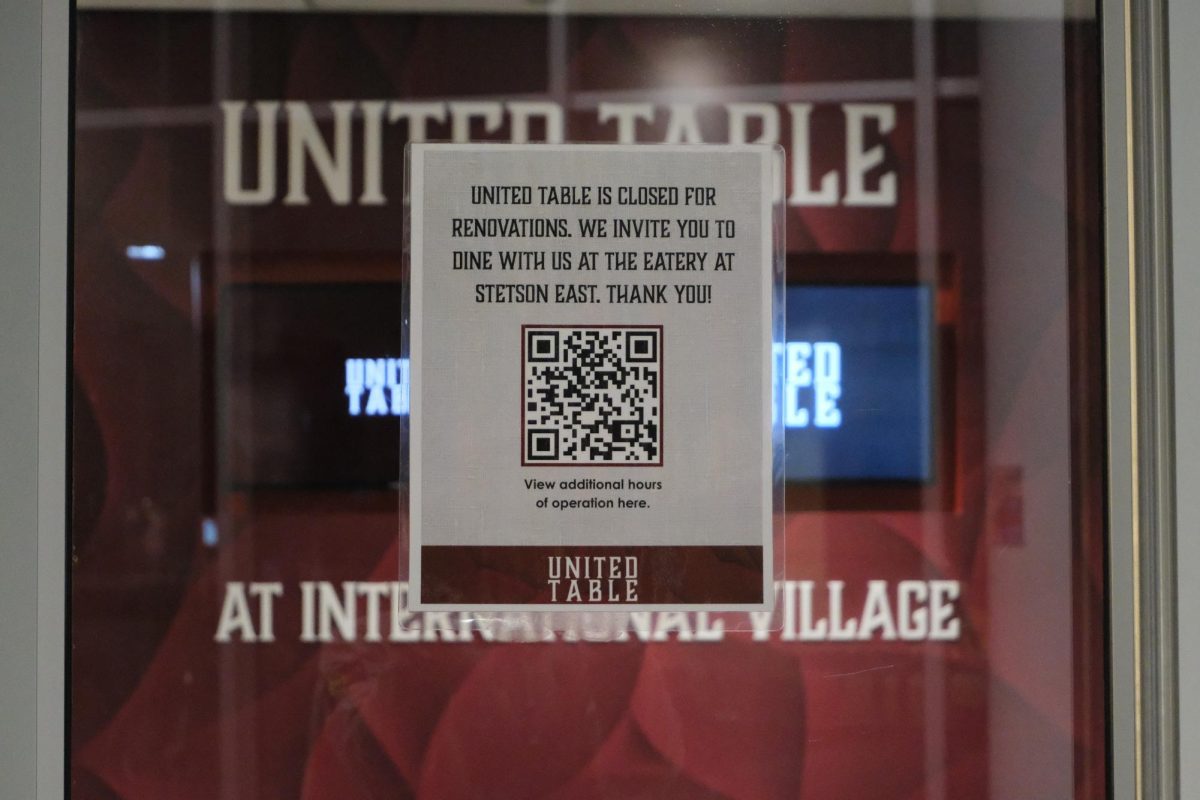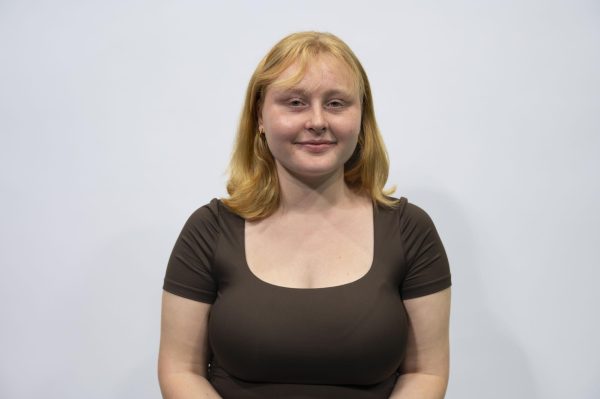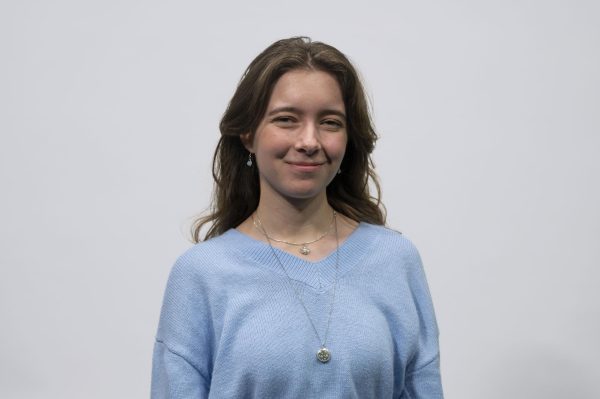In 2023, the Supreme Court struck down race-based affirmative action in college admissions. The impact of the ruling reverberated at universities across the country, several of which experienced dramatic drops in Black student enrollment the following academic year. Northeastern saw a 35% decrease in Black student enrollment for its Class of 2028 — a drop several Black students told The Huntington News made them feel demoralized and isolated. Most recently, following a Jan. 21 executive order issued by President Donald Trump, Northeastern removed all of its diversity, equity and inclusion, or DEI, content from its official websites, rebranding related messaging to its “Office of Belonging.”
The Huntington News sat down with two leaders from Northeastern’s Black Student Association, or NBSA, in the John D. O’Bryant African American Institute to discuss how the United States’ current political climate has impacted Black students on campus. Sean Odom, a fourth-year business administration major, serves as NBSA’s vice president, and Phylicia Dias, a second-year music and communications studies combined major, serves as NBSA’s communications coordinator.
The conversation has been edited for length and clarity.
The Huntington News: How are you two protecting your mental wellbeing when you’re getting all of this news and everything is a bit up in the air?
Dias: Something that I’ve particularly been doing to encourage myself is just surround myself by Black excellence, in a sense. I’m a music industry major, so I surround myself by a lot of people who are Black and uplift the community through community development programs. And this has honestly encouraged me more because I’m starting to find that I’m losing trust in Northeastern as a university to provide that community development that it always ensures that it will bring.
Having these discussions in class is really important because I’m one of maybe two Black people in my class usually. So when we can have these discussions, it’s encouraging because those who don’t look like me have the same fears as me, and we all have the same concerns for our school. So that’s encouraging.
Odom: I think for me, what I’ve been really concerned about is feeling like I belong, and it’s so crazy that we have this Office of Belonging now. Particularly, I feel like with Black students, you see a big issue with imposter syndrome. I was sitting here just thinking, “Wow, I’m here. Why am I here? How did I make it to this point? Am I qualified to be in these spaces?” There are so many other Black people who don’t have access to this same opportunity. It’s like I’m taking opportunities away from other people now.
I was just really kind of questioning myself and all of that. What does this mean for me being here? Do I even belong? Am I valued? They’re accepting less and less Black students, so what is really the value of me being here?
What I’ve been trying to do is just tell myself, “You do belong here.” And this is even more of a reason why I think I belong here. I think our voices matter even more now. I think it’s important to show other Black students — particularly Black students who are going to apply to Northeastern — there are Black people here.
HN: Do you remember the impact of Northeastern’s 2020 anti-racism plans on Northeastern’s Black student community?
Odom: With the Northeastern Black Student Association, particularly in 2020, when the George Floyd thing was happening … the school came and talked to the Northeastern Black Student Association. [The NBSA’s] president at the time had a conversation with John D. O’Bryant, the [previous] head of the Institute here, and a few directors from the space, and they had a conversation with those students about, “How can we make sure we’re prioritizing your space? How can we make sure we still show up for you guys?”
But to see that they’re not doing that now, no one has contacted us and said, “Hey, let’s try to have a conversation about making sure we can still provide you the resources to know that you belong.”
Now, no one’s talking to us. No one’s saying, “Hey what can we do to make sure we put policies and procedures in place to still preserve you all?” Is the university really showing up for us? Are they really making sure that they prioritize our spaces? I’m not too sure about that.
HN: What do you think is the value of having these spaces, like a Black Student Association, here on campus, and what do you hope these spaces will grow into given these new developments?
Odom: I think, most importantly, what matters in college is having support, having people to be there along the way. Having these spaces is important because it reminds students that there are other people that look like you, there are other people who are in your same shoes, the people that you can go and talk to.
We don’t often see Black people in these spaces, and so it’s kind of that reminder that you’re qualified, you’re smart, you can do it, there are other Black people here who are also doing it, so I think being able to see that is very valuable.
Dias: People get very homesick when they’re not around like people who look like them. I have friends that are like, “I don’t see my people here, and I don’t want to come here anymore.”
HN: What would you recommend to students who are looking for some way to get involved or help with all of these issues now facing campus?
Dias: I honestly would say find your people and just go to your community, find your community and express your concerns because [there is a] 100% chance other people are feeling the exact same way as you. We have four years of this nonsense so we need to come up with some sort of solution for the long term because there’s no way that we can see weekly changes that affect our mental wellbeing and affect how we operate as students, as Huskies.
Odom: I want to add also to my students who want to know what to do: Go to clubs, please. We need you. I think people don’t understand that Northeastern is constantly monitoring how many students are going to certain events, how much resources are you using, how much money is this club spending, how many events do they have, who’s doing what, who’s attending, who’s coming.
So to my students, please show up for each other. And I want to say that to my non-[Black, indigenous and people of color] students, I know it can be intimidating … but please show up still. Although we say we’re centering or we’re focusing on Black students, that doesn’t mean we don’t want you there.
HN: What have your numbers been like for the semester? Have you seen an increase or decrease in attendance?
Odom: I would say for sure this semester, there has been an increase.
Dias: I think now people are more concerned and more willing to have these conversations and come in attendance because they’re starting to realize things are changing, things are shifting in our everyday society and they’re getting nervous and they want to find their people.
HN: What could professors or students in a classroom space do to facilitate these conversations?
Odom: I think to my white students here on campus because they think things don’t affect them, they’re not talking about it, right? … There’s so many of you all, please use your voices, because this is where the numbers are. You all are the majority.
HN: For students who are not really as focused on this, how would you put into words the university’s rebranding to “Office of Belonging” might signify?
Odom: I think what it signifies to me is lack of care and lack of prioritization because I think that now this gives leeway to underrepresented communities being ignored. And I think that’s what matters because once communities get ignored, that allows for more violence to happen, that allows for lack of resources to be allocated to certain places, that allows for less enrollment. So yes, we might not see those physical impacts happening right now, but when we start to ignore certain people, then those impacts can be facilitated.
It’s just a website change now, but we have to think about future generations, right? And once again, I’m just really scared of what it means for incoming students later on. One year down the line, two years down the line, three years down the line.
Because now, if it’s a simple website change in the first week, what’s happening in two years? What’s happening in three years?
Dias: How do we make other people care? I think that’s a question that we’re still asking ourselves. And I think it’s a question we’re gonna have to ask more often, probably, which is a little upsetting, but I feel confident.












